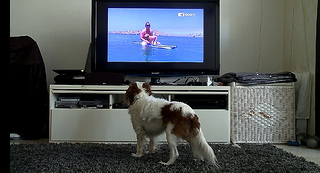Video:
http://www.youtube.com/watch?feature=player_embedded&v=ZLJdb6Yhg2I
All across San Diego, California, pet pooches are no longer depressed and bored when their humans go off to work and school. As of February 13, they have their own television station to keep them company: DogTV (
http://dogtv.com), an Israeli concept come to life on the screen through Time Warner Cable and Cox Communications.
After it’s been test-marketed for six months, the 24-hour digital cable channel is set to go into wider distribution as a subscription-based service, says DogTV CEO Gilad Neumann. He reveals that the numbers so far are “surprisingly good,” and many owners enjoy sharing images of their dogs watching TV on social networks.
“We created the test market in San Diego because it’s a very good dog-friendly environment, with dog beaches, dog parks, dog daycares -- and it’s also a very interesting footprint for Time Warner and Cox, because it’s a small geographic territory with one million subscribers,” Neumann says.
DogTV is not just a gimmicky way to cash in on people’s passion for their pets. Unlike “bark mitzvah” parties or dog bakeries, DogTV seeks to meet a proven need.
“The channel is based on combining two concepts that are already out there,” says Neumann, who holds an MBA from Pepperdine University in California and a law degree from the Israeli College of Management.
“Many major organizations, like the ASPCA [American Society for the Prevention of Cruelty to Animals], the American Veterinary Medical Association and the Humane Society of the United States, recommend leaving the TV on for your dog to provide stimulation and keep away stress and depression. We combined this with a lot of science on the effects of video on dogs, how they react to TV and what kind of visuals, music and sounds they enjoy.”

Prince may be stuck at home, but he can enjoy lots of adventures on screen.
Millions of lonely dogs
Neumann explains that the concept was first floated by Ron Levi, a New York-born dog lover and chief content officer at Jasmine Group, a private media communications company in Ramat Gan.
At the time, Neumann was CEO of Jasmine TV, one of several subsidiaries of the media conglomerate whose July August production company recently sold the format for the hit game show “Who’s Still Standing?” to NBC Universal.
“We’re always seeking interesting ideas with an emphasis on international expansion. So when Ron approached me with this idea, I thought it was crazy enough to look into,” says Neumann. He suggested that Jasmine invest some seed money to see if the idea had legs.
And here’s what they learned: A total of 78.2 million pet canines are owned by 46 million households in the United States. When they are left alone, these dogs can get depressed, losing their appetite and their desire to play.
“That’s quite a few potential viewers and many lonely dogs,” Neumann points out.
To help develop the content, he recruited Prof. Nicholas Dodman of Tufts University’s animal behavior department as program director and chief scientist, along with Animal Planet’s “It's Me or the Dog” trainer Victoria Stilwell and radio broadcaster Warren Eckstein, an animal rights activist and pet trainer.
“They added their knowledge to our production experience,” says Neumann. “It’s all very scientific, although I know it sounds like a joke. When you dig deeper, you see it’s a serious business. We worked very hard to make Ron’s idea a reality.”
Fully suitable for dogs
The technological timing was just right for the project, since dogs’ eyes apparently had a tough time with the transitions between frames on older televisions, which humans don’t notice.
“Now they can see perfectly fine on LCD, but they can only see blue and yellow, so we enhance and recolor the contents for them,” Neumann explains.
Under Levi’s direction as content developer, the channel offers three categories of programming: shows meant to relax dogs, shows that stimulate them and shows intended to expose them gently to everyday situations with which they may need to get more comfortable.
“This creates a companionship environment,” says Neumann, “a channel that is fully suitable for dogs. Owners can be sure it’s all appropriate, and there is no content that scares or stresses the dog, like loud or sudden noises.”
If DogTV takes off, it would be another in a growing string of Israel-innovated hits on American television, although it would be the first that’s not an adaptation.
“In Treatment” was the series that started this ball rolling. Other adaptations include the award-winning “Homeland,” “Traffic Light” and “The Ex List.” Most recently, CBS announced is planning an American version of “Shalosh” (“Three”), an Israeli reality series about three women searching for love.
Thanks to DogTV, though, puppy love has hit prime time.